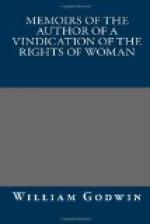The procrastination of which I am speaking was however productive of one advantage. It put off the evil day. She did not suspect the calamities that awaited her, till the close of the year. She gained an additional three months of comparative happiness. But she purchased it at a very dear rate. Perhaps no human creature ever suffered greater misery, than dyed the whole year 1795, in the life of this incomparable woman. It was wasted in that sort of despair, to the sense of which the mind is continually awakened, by a glimmering of fondly cherished, expiring hope.
Why did she thus obstinately cling to an ill-starred, unhappy passion? Because it is of the very essence of affection, to seek to perpetuate itself. He does not love, who can resign this cherished sentiment, without suffering some of the sharpest struggles that our nature is capable of enduring. Add to this, Mary had fixed her heart upon this chosen friend; and one of the last impressions a worthy mind can submit to receive, is that of the worthlessness of the person upon whom it has fixed all its esteem. Mary had struggled to entertain a favourable opinion of human nature; she had unweariedly fought for a kindred mind, in whose integrity and fidelity to take up her rest. Mr. Imlay undertook to prove, in his letters written immediately after their complete separation, that his conduct towards her was reconcilable to the strictest rectitude; but undoubtedly Mary was of a different opinion. Whatever the reader may decide in this respect, there is one sentiment that, I believe, he will unhesitatingly admit: that of pity for the mistake of the man, who, being in possession of such a friendship and attachment as those of Mary, could hold them at a trivial price, and, “like the base Indian, throw a pearl away, richer than all his tribe.[A]”
[A] A person, from whose society at this time Mary derived particular gratification, was Archibald Hamilton Rowan, who had lately become a fugitive from Ireland, in consequence of a political prosecution, and in whom she found those qualities which were always eminently engaging to her, great integrity of disposition, and great kindness of heart.
CHAP. VIII.
1795, 1796.
In April 1795, Mary returned once more to London, being requested to do so by Mr. Imlay, who even sent a servant to Paris to wait upon her in the journey, before she could complete the necessary arrangements for her departure. But, notwithstanding these favourable appearances, she came to England with a heavy heart, not daring, after all the uncertainties and anguish she had endured, to trust to the suggestions of hope.
The gloomy forebodings of her mind, were but too faithfully verified. Mr. Imlay had already formed another connexion; as it is said, with a young actress from a strolling company of players. His attentions therefore to Mary were formal and constrained, and she probably had but little of his society. This alteration could not escape her penetrating glance. He ascribed it to pressure of business, and some pecuniary embarrassments which, at that time, occurred to him; it was of little consequence to Mary what was the cause. She saw, but too well, though she strove not to see, that his affections were lost to her for ever.




